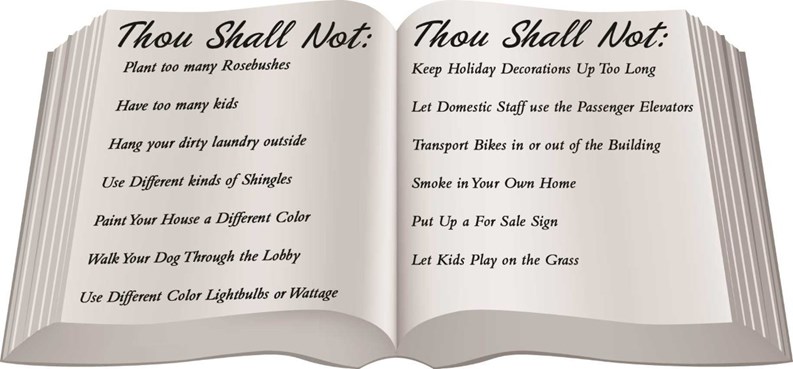Condos and homeowner associations have made headlines over the years for passing all kinds of overreaching and downright silly rules and regulations—everything from forbidding the flying of the American flag to having prohibitions about hanging laundry outdoors, to discriminating against their own residents—even stopping kids from playing ball or riding their bikes in their own yards. It might sound like something out of a political satire, or items from a humorous 'News of the Weird' newspaper column, but these stories of some boards going too far are true, and we've collected some of the silliest, most unusual or most outrageous HOA rules ever passed.
The Ugly Truth
Did you hear the one about the Florida family that was about to be kicked out of their HOA because the wife had just had twins? The family already had one child, and the arrival of the twins would put them over the two-kids-per-unit allowed by their North Palm Beach condo. The condo was not an 'active adult' 55-and-over community, but nevertheless it had a rule on the books limiting occupancy to two children. A bit Machiavellian to be sure, but true.
Or how about the Fort Myers condo that fined a man suffering from ALS $100 a day because he was using a shopping cart instead of a walker to get around his unit, the parking area and the grounds? Apparently the community had a rule forbidding the use of any 'storage item' in a common area like a walkway.
Another Sunshine State condo passed a rule preventing two unmarried people from living together, aimed at stopping gay couples from living in the development. After an uproar about the ban, the rule was reversed earlier this year.
Or take the case of a Long Beach, California woman who needed to use a cane, and kept a cocker spaniel as a companion animal. Her HOA banned her from walking the dog through the lobby, because they had a rule that all pets had to be CARRIED so their little paws wouldn’t touch the floor. (Good thing she didn’t have an English sheepdog.) She was fined $25 a day and racked up hundreds of dollars in fines before she finally gave up and moved from the building.
It’s Perfectly Legal …
Yes, a co-op, condo or HOA board is legally allowed to administer their own rules and regulations—all for the unique privilege to live in such a community. Under the business judgment rule, courts have given boards of directors wide discretion in passing rules that they feel are in the best interest of everyone in the community—as long as it’s done in good faith.
Many HOAs routinely have a list of approved exterior paint colors: they can tell you what color to paint your fence or your deck, what type of plants or landscaping you can have, what type of trees and shrubs are permissible. They can limit commercial vehicles parked in your own driveway, or require that cars and other machinery not be visible from the street if it’s an eyesore. They can restrict certain types of signage, even real estate signs.
Boards play a central role in regards to rules and regulations for homeowner associations. They have the power to make them, and the responsibility to enforce them, and enforce them fairly. Unlike other states, Illinois provides a framework for this.
“The rules generally regulate the day-to-day activity of unit owners. Rules and regulations cannot be used to limit ownership rights, like the right to lease. You can't restrict rentals or say 'no pets' in rules and regulations but they can be used to regulate,” says Ebony Lucas, an attorney with The Property Law Group in Chicago.
What’s a Well-Meaning Board to Do?
Experts are pretty much in agreement that the best advice before taking any action to pass a new rule is to consult your legal team to make sure it's enforceable and unlikely to result in litigation. Also remember that many rules—no matter how outlandish they may sound—may indeed be warranted and have a purpose in addressing an issue the co-op, condo or HOA is facing.
“The single best thing board members can do is to speak with their association attorney first before spending time drafting or adopting rules,” advises Donna DiMaggio Berger, a shareholder attorney with the Florida law firm of Becker & Poliakoff. “It is important to understand that certain restrictions simply cannot be passed by board rule alone. Other times, there is a provision in the governing documents which requires membership approval for some or all board rules,” she says.
Many condos/HOAs around the country have in their governing documents provisions requiring anywhere from a simple majority to 75 percent approval before any bylaws, rules, or house rule provisions can be amended.
James Arrigo, senior counsel at the law firm of Tressler LLP in Bollingbrook says you have to ensure fairness and reasonable rules are on the books. Arrigo says the key to establishing a sound rule for the association is to keep in mind that it's “something that's fair, that's not overly restrictive, and can be evenhandedly and fairly enforced.”
Board members might find that enforcing rules in a fair way is more laborious than writing fair rules. From a legal and ethical standpoint, how you call people out for infractions has to be very methodical. “In a lot of cases, associations will require that either a board member observe the violation, or if the violation's being reported by a resident, that the resident submit something in writing that they signed, so we're not talking about anonymous phone-in complaints,” says Arrigo. As one can imagine, if there's no accountability system in place for violation reports, a small incident or grudge between neighbors could devolve into a witch hunt, and possibly a legal nightmare.
Berger also states that you should do your due diligence in researching the issue to make sure the rule you’re passing is warranted and does not cause any problems down the road.
“Lastly, you want to make sure that a contemplated rule does not contradict another provision in the governing documents or in the pertinent statutes, that it is properly passed and that the members are properly notified of its existence. Boards should spend 95% of their time identifying the problem and 5% crafting the solution via rule. Unfortunately, most approach the issue in the reverse order,” Berger says.
Bad Moon Rising
In counseling hundreds of condominium, cooperative, timeshare, mobile home and homeowner associations throughout Florida since 1992, Berger has seen her share of unusual rules. Here’s one that she particularly remembers. “One of the craziest rules I ever came across was one which made me wonder what prompted its passage in the first place. It was a rule in a rather placid HOA which prohibited nudity in their common areas.”
It’s not surprising that many of the more controversial rules hail from associations in Florida. When asked about that, Berger says that it is due to the Sunshine State’s large number of community associations and HOAs. However, she notes that the problem exists no matter what region of the country or municipality you are located in.
“The sheer number of associations in Florida lends itself to our state making news and case law when it comes to the enforcement of rules and regulations,” Berger says. “The issues you mention above are tackled in every state where shared ownership communities exist—we just have more of them down here. We also have a community association population that is highly educated on their rights thanks, in large part, to all the free resources and information available.”
War of the Roses
Here are some more actual condo/HOA rules from around the country:
An HOA in Texas has two garage sales a year, and they’ve passed a dress code for certain neighborhood activities. So at garage sales, community gatherings, swim parties, etc., residents and guests have to be attired appropriately. For garage sales, they must wear polos and khakis (with a $30 fine for non-compliance); members cannot share towels at the swimming pool, even if you bring your own for your family ($25 fine); you must remove holiday decorations within three days of the end of the holiday ($50 fine); and, you cannot use a different color light bulb unless approved by the HOA ($25 fine).
A Rancho Sante Fe, California man was hit with a lawsuit by his condominium because he exceeded the number of rose bushes he was allowed to plant on his four-acre property. The HOA levied multiple fines, took the resident to court and ultimately won. The man had to pay the HOA’s $70,000 legal bill, and lost his home to the bank in a foreclosure action.
A sad story is that of a Sanford, Florida homeowner who lost his wife and infant son when a plane crashed into their home. The HOA fined him during the reconstruction for using shingles that didn’t perfectly match that of his neighbor’s homes.
A New York City condo in the hip SoHo neighborhood that caters to artists and creative types wanted to be sure that their residents were sufficiently talented before being allowed to buy into the building. It was their policy to screen who was living there—by vetting and approving—the quality of their creative work in a twist on the juried MFA exhibit.
Mediation and Enforcement
Little things can escalate, as any attorney will tell you. Before making matters worse and having your community’s dirty laundry hung out to dry in the local and national news, community association and HOA boards should try and defuse a headline-grabbing news story before it becomes news. Seeking mediation, imposing reasonable fines, and compromising with the parties involved are all avenues to consider, the experts say.
Rules should be fair and fairly applied, says Berger. “Boards should first ensure that the rules they wish to enforce pass the reasonableness test and that they are being applied consistently and uniformly. If they can honestly say that is the case, the next step is to give the rule breaker an opportunity for a hearing prior to a fine being levied,” she says. “Many times the violator will show up, but sometimes they will not. In those cases where the rule is reasonable and the violator is not interested in correcting the situation the board should proceed with enforcement. It is not punitive to enforce a reasonable rule that others are readily following.”
New York City attorney Jeffrey Reich says that boards should try to pass what’s called in the law as “bright line” rules, which are rules which leave little room for discretion and/or interpretation. These types of rules would provide clarity for both management and the building residents and reduce the chance that anyone is being treated differently, he says.
When rules are ignored or otherwise overlooked by unit owners, the board has an obligation to carry out some form of disciplinary action, which can happen immediately or gradually over time, Lucas says. To this end, rules that go unenforced can compromise the overall operation of the building community.
“Boards can fine the unit owner,” says Lucas. “The Illinois Condominium Property Act allows the board to charge a reasonable late fee after notice and an opportunity for hearing. In some cases, the declaration requires that the board give a certain number of days to cure a violation, so boards should look out for this. The board can also enforce rules against a tenant through an eviction. In some circumstances, declarations allow associations to force the sale of a unit if a unit habitually violates the declaration.”
Berger puts it quite succinctly. “One of the main reasons most purchasers buy in a private residential community governed by a mandatory association is that they expect the covenants and restrictions to be enforced much more quickly and consistently than would happen in a neighborhood subject only to county and city codes and ordinances,” says Berger. “There is a general expectation in private communities that one will not find unkempt lawns, cars on cement blocks, high crime rates and a myriad of other negative factors that can be controlled by reasonable rules, which are properly enforced.”
Debra A. Estock is managing editor of The Chicagoland Cooperator.







2 Comments
Leave a Comment